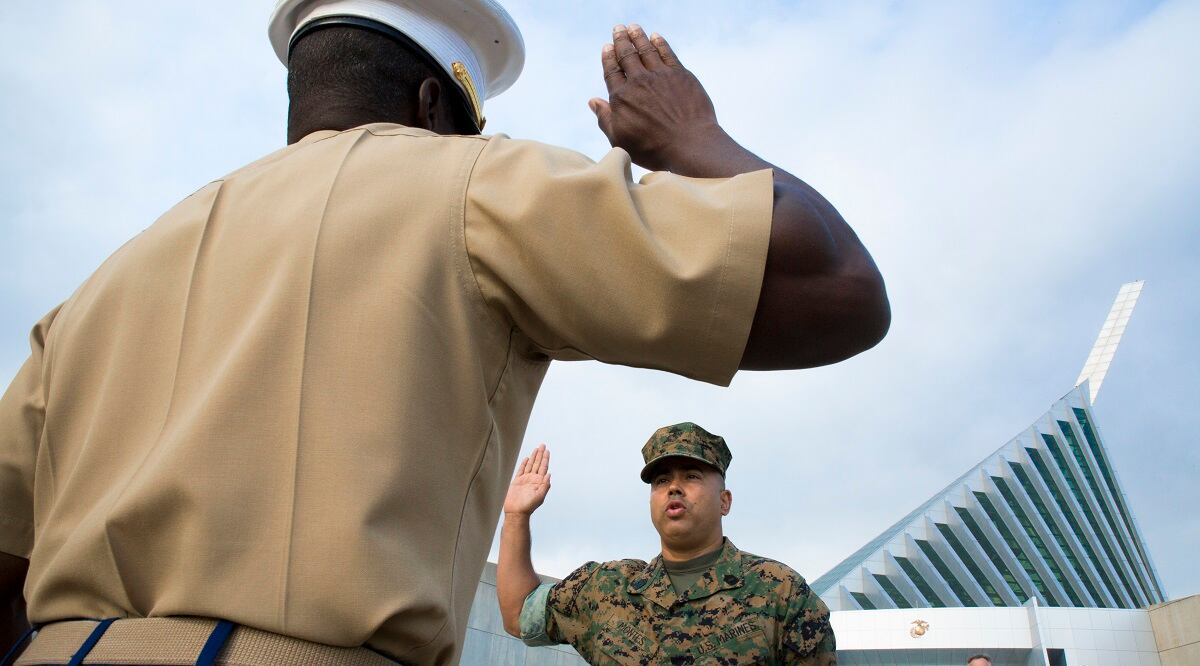The Marine Corps needs increased diversity to fully implement the force design changes required to face off against China, Russia or other potential threats, said Marine Brig. Gen. A.T. Williamson, director of manpower, plans and policy, in early August.
“The commandant right now is focusing on force design … the Marine Corps is making a concerted effort right now in investing in several capabilities,” Williamson said at the Navy League’s Sea-Air-Apace 2021 conference in National Harbor, Maryland. “But what the commandant has stated, and what we as Marines always know is, the primacy of that expeditionary force is the Marine.”
RELATED

His remarks echo those made by Marine Corps Commandant Gen. David Berger in 2020 at the Women in Defense Virtual Leadership Symposium.
Some people “think that diversity — women, minorities — add” to the Corps’ success,” Berger said then. But it goes beyond that. “We can actually not do our mission in the Department of Defense, in the Marine Corps, without the dedication of women.”
Williamson laid out three reasons the Corps needs to be a diverse institution, which he termed the ethical, practical and operational imperatives.
“The American people need to know their military … reflects those they support and defend,” Williamson said, so the “ethical imperative” is simply to do the right thing in terms of inclusion and fairness.
The practical imperative, he said, refers to the Corps’ need to tap into a shrinking, but more diverse, pool of people in the country who qualify for the military.
“We don’t want to leave any talent on the table,,” the general said, “everyone is competing for the same talented pool of men and women. They are going to work somewhere.”
But, most important is the operational imperative, he said.
When looking at the complex battlefields of the future, “it is all about lethality and warfighting,” Williamson said.
“It’s challenging;, it is full of problem sets that one group — that one team — are not going to be able to solve alone,” he said. “We need to be able to open up the diversity of thought, of experience, of background, to try and attract people who are going to help us solve those very complex problems.”
Today, unconscious bias may play a role in unfairly forcing good Marines to leave the Corps or denying them opportunities to improve themselves, Williamson noted.
“If we see that a particular demographic or subgroup or element is not performing to standard or not performing as well as others, we ought to be intellectually curious enough to ask why, not just accept that and believe that that is going to fit a certain bias that we have,” he said.
Some biases are not only good, but necessary, for the Marine Corps to thrive, he said.
“We all are slanted or have certain perceptions,” he said. “In fact, in the Marine Corps, we expect Marines to have a bias towards action … we have a bias towards being disciplined… we are biased towards physical fitness.
“There are negative biases, or there are biases that are misguided, misinformed or just flat out wrong,” he added.
The Corps must identify how those negative biases affect the evaluations, promotions and opportunities given to Marines, to take the “emotion” out of those processes and give every Marine a fair chance to succeed.
Once the concept “unconscious bias: is honestly taught to, and understood by, Marines, the Corps will be able to overcome the problems introduced by negative stereotypes that reduce diversity in the ranks, he said.
But beyond just understanding what unconscious bias is, commanders need to implement policies and programs that actively counteract the negative biases that may derail some Marines’ careers.
Historically, the Corps has introduced programs that looked good on evaluation paperwork, but too often failed to meet the goal of increasing diversity in the ranks.
“There are a lot of actions that are going on in the space, but if it is not hitting our outcomes then it is just activity,” Williamson said.
The Corps is now introducing steps to measure how this “activity” affects the mission.
“It is difficult to hold accountable a commander or anyone for just activity, but it is very easy to hold them accountable when I give them an assigned mission, tell them what the expectation is, then give them the tools they need to be successful,” Williamson said.
“Commanders are given a lot of trust and confidence> They are expected to positively affect their environment … but we also need to give them the tools,” Williamson said.
The Corps plans on developing and distributing what leaders are calling a “commander’s tool kit” to teach leaders how to improve diversity and help their Marines.
Once commanders receive those tools and training, they will be expected to meet the mission on diversity.
“After we help develop this, what we want to call a commander’s tool kit, we can hold you accountable for establishing diverse, inclusive environments … so that everyone can perform and succeed,” he added.
This will lead to a Marine Corps that has a culture of inclusion and is positioned to maximize the abilities of every Marine.
“It is about bringing in young men and women and making sure that everyone’s gifts, talents and abilities are fully actualized,” Williamson said.




